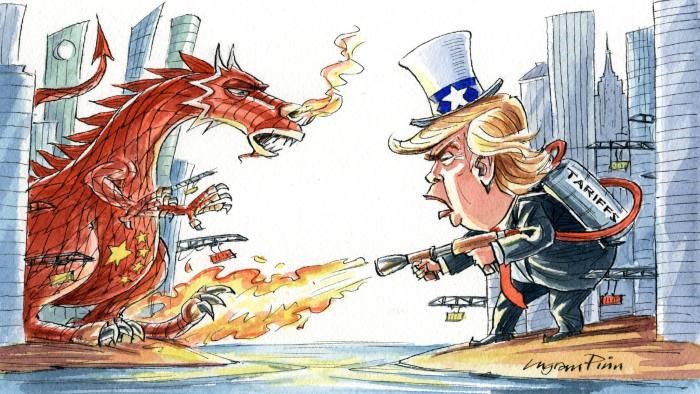
China has changed the world. It has been too slow to understand that it has also changed the world’s view of China. These are unsettling times for Beijing. Until now China’s rise has been on its own terms. There have been bumps and squalls and the occasional stand-off with Washington, but mostly the west has been distracted or amenable. Chinese leaders have grown used to getting their own way. Now, China’s feet are being held to the fire.
There is a temptation to imagine that party chiefs have a carefully worked-out strategy in response to the latest package of punitive tariffs announced by US president Donald Trump — the equivalent of a $25bn tax on Chinese exports to the US. It is axiomatic among much western commentary that China always thinks three moves ahead. The signs now are otherwise. Those reading the runes in Beijing say the leadership has been caught badly off guard.
Years of deep research into the way America works have been confounded by Mr Trump’s wilful unpredictability. Beijing’s intelligence is weak. The high-level contacts in Washington and beyond — so carefully cultivated by Chinese officials — did not include the hardliners now setting the pace in the president’s inner circle. Beijing has for years studied the inter-agency process of US decision-making only to discover that to know by heart how US administrations usually work is not to know what Mr Trump will do next — or why.
The US president is by nature volatile — witness his bomb-you-hug-you approach to North Korea’s Kim Jong Un. There is more to China’s discombobulation, however, than confusion wreaked by Mr Trump’s crudely mercantilist view of trade balances or the inconstancy of White House decision-making. Beijing should look also to the change wreaked by its own behaviour.
During the past several years China has reshaped the dynamics of its relationship with the west. This reaches well beyond Washington. Ask most European policymakers what they think of a Sino-American trade war and they will tell you that Mr Trump’s approach is dangerous and counterproductive — it will end up in lose-lose, rather than win-win. Yet behind their hands these devoted multilateralists and free traders will admit a certain satisfaction that someone has “stood up” to Beijing.
Not so long ago most western governments looked at China through the lens of rich market opportunities. Some still tilt in that direction. But, in Europe at least, Beijing’s growing assertiveness, a suspicion that it is using its financial clout as a tool of geopolitical coercion and its unabashed appropriation of western technology has changed the mood. China suddenly looks a strategic threat as much as a market opportunity.
Xi Jinping cannot complain he has been blindsided. China’s emperor-president has cast off the stylised humility of his predecessors to celebrate both his personal power and China’s global status. Foreign critics are brusquely dismissed for failing to appreciate “the fact” of China’s rise. The People’s Liberation Army shows off its prowess in the disputed South East China seas. The Belt and Road Initiative sees Beijing building strategic outposts across Asia and into Africa. Its investments in the weaker economies in eastern Europe fit a suspicion in Brussels that it is pursuing a policy of divide-and-rule.
None of this is to say that Mr Trump’s trade tariffs are a rational response. If retaliation leads to further escalation the world eventually will stumble into a full-scale trade war and economic slump. Beijing, however, would be foolish to underestimate the curious coalition that one way or another finds itself standing behind the US president. There are plenty of China hawks who disagree profoundly with Mr Trump’s views on trade but welcome any opportunity to rein in Beijing.
An intelligent response on China’s part would start by recognising the risk of a broader clash. Unsurprisingly, Mr Xi has felt the need to respond to the latest tariffs, but there is retaliation and retaliation. In its measured form it leaves open the road to a resumption of serious negotiations. Waiting it out until after the US midterm elections in November would provide room to assess how far Mr Trump is being driven by short-term political pressures.
On the other hand, a more aggressive reaction would open the door to those in Washington who want to impose a permanent set of restrictions and restraints on economic relations between the two countries. There are those in the west with fond memories of the COCOM rules against technology transfers to the Soviet Union during the cold war. Today’s American technology companies have deep interests in China. But Beijing would be the bigger loser from a spillover to the technology sector of the present dispute.
The harder task for Beijing will be recognising that to a significant extent it has been the author of its own predicament. Western business leaders, trade negotiators, commercial lawyers — they all have a story to offer of promises made and broken in Beijing, of unreasonable obstacles to doing business, and the loss of precious intellectual property. If China wants to win arguments in Washington it needs friends in the American business community.
For the first decades of its rise, “hide-and-bide” modesty gave China control of its own story. Hubris has handed the pen to its critics. Great power status, Mr Xi might reflect, has its own traps.
Source: Financial Times, September 21,2018 | Philip Stephens